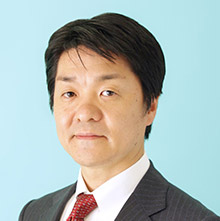Materiality of the Daigas Group
Material Issues (Materiality) of the Daigas Group
In March 2024, the Daigas Group announced Medium-Term Management Plan 2026: Connecting Ambitious Dream. In formulating the Medium-Term Management Plan 2026, we reviewed the materiality and set indicators based on the previous Medium-Term Management Plan (FY2021.3-FY2024.3), the progress of climate change countermeasures, changes in the business environment, and social demands.
■ Identified materiality and related SDGs

Process of Materiality Identification
We consulted the Global Reporting Initiative (GRI) Standards for the procedure for identifying our material issues. Referring to material topics (economic, environmental, and social topics) in topic-specific GRI Standards (the 200, 300, and 400 series), we assessed the social and environmental impacts of various issues and their financial impacts on the Daigas Group’s future. The identified material issues were discussed by the ESG Committee and the ESG Council and then approved together with the Medium-Term Management Plan by the Board of Directors. From now on, we will strive to achieve the KPI targets for our material issues while making the PDCA (plan-do-check-act) cycle function well and will report the progress every year.
■ Process of Materiality Identification
(during the formulation of the Medium-Term Management Plan 2026)

■ Recognition of Risks and Opportunities and Materiality in Sustainability Management
| Changes in the business environment and the associated issues that need to be addressed | Risks | Opportunities | Materiality |
|---|---|---|---|
|
|
|
Provide carbon neutral energy |
|
|
|
Enhance the resilience of customers and society |
|
|
|
Co-create advanced, diverse solutions that meet customer values |
|
|
|
Create a work environment where employees and the company resonate and enhance each other |
|
|
|
Maintain and improve the soundness and flexibility of management foundation |
Changes from the Previous Materiality
In the Medium-Term Management Plan 2026, we have developed indicators for materiality as "provide carbon neutral energy," " enhance the resilience of customers and society," "co-create advanced, diverse solutions that meet customer values," "create a work environment where employees and the company resonate and enhance each other" and "maintain and improve the soundness and flexibility of management foundation" that are more strongly associated with management approaches. We will thus drive the co-creation of value for a sustainable future, strengthening of human capital, and evolution of the business foundation.
■ Changes from the Previous Materiality
■ Why the Issue Is Material
| Materiality | Why the Issue Is Material |
|---|---|
| Provide carbon neutral energy |
|
| Enhance the resilience of customers and society |
|
| Co-create advanced, diverse solutions that meet customer values |
|
| Create a work environment where employees and the company resonate and enhance each other |
|
| Maintain and improve the soundness and flexibility of management foundation |
|
Comment by Outside Expert The Daigas Group's Identification of Materiality (Medium-Term Management Plan 2026)
-

Hidemi Tomita
CEO,
Institute for
Sustainability
Management
-
While the process for identifying materiality has not changed significantly from FY2021.3, when the previous Medium-Term Management Plan was formulated, relevance to corporate strategies is clearer this time. This can be attributable to the fact that materiality was identified with consideration given to medium- to long-term targets, including the Carbon Neutral Vision announced in January 2021 to achieve carbon neutrality by 2050. As with the last time, the Daigas Group adopted the idea of so-called double materiality, where both financial impacts and social and environmental impacts are taken into account. This approach can be considered appropriate as the Group engages in infrastructure-related businesses that have considerable social and environmental impacts.
The identified materiality has a limited number of elements, indicates overall directions, and is clearly aligned with “Key Strategy: the Three Commitments” in the Medium-Term Management Plan 2026. When it comes to KPIs that are linked with materiality, financial indicators are increasingly integrated with sustainability indicators with an eye on 2026, the target fiscal year of the Medium-Term Management Plan. Meanwhile, part of the targets are qualitative. Going forward, I expect the Group to improve accountability for such targets and fine-tune them.
Materiality Review Cycle
Activity Report on KPIs
- Management Plan
- Management Plan Documents Long-Term Management Vision2030/Medium-Term Management Plan 2026
- Daigas Group's Values
- Daigas Group's Values Daigas Group Corporate Principles Daigas Group Charter of Business Conduct Daigas Group Code of Business Conduct Our Declaration Daigas Group Policies
- Sustainability Management
- Promotion System Materiality of the Daigas Group Stakeholder Engagement History of Co-creation of Value Value Creation Process
- Environment
-
Environment
Environmental Management
Daigas Group Environmental Policy
Estimation Method of Environmental Accounting
Environmental Management Efficiency
Environmental Impact throughout the Daigas Group Value Chain
Environmental Targets
Actions for Climate Change
Assessment of CO₂ Emissions Reduction Effects
Disclosure Based on the TCFD Recommendations:
Recognition of and Action on Risks and Opportunities Contributing to the Resource-Recycling Society Data Trends Regarding Resource Recycling Information Disclosure on the Research Results of Soil and Groundwater Conservation Biodiversity Daigas Group Biodiversity Policy Development of Environmental Technology
- Social
-
Social
Innovation Management
Promoting Business Transformation with DX Research and Development/Intellectual Property/New Businesses Creation Human Resources Management/Human Resources Strategy Targets Human Resources Development DE&I (Diversity, Equity, and Inclusion) Daigas Group Diversity Promotion Policy Work-Life Balance Occupational Health and Safety Communication Between Employees and Company Human Rights
Respect for Human Rights throughout the Value Chain
Human Rights Due Dilligence
Action for Human Rights Daigas Group Human Rights Policy Supply Chain Management Daigas Group Procurement Policy Social Impact of Business Activities in Our Energy Value Chain Customer Health and Safety Customer Satisfaction Community
Co-creation Activities with Local Communities
Activities by Public Interest Incorporated Foundations
- Governance
- Governance Corporate Governance Message from the Outside Directors Compliance Consultations and Reports from Partner Companies Information Security Protect Personal Information
- Reporting Guidelines
- Global Reporting Initiative (GRI) Index SASB Table Reference for the Environmental Reporting Guidelines of the Ministry of the Environment TCFD Recommendations Table

